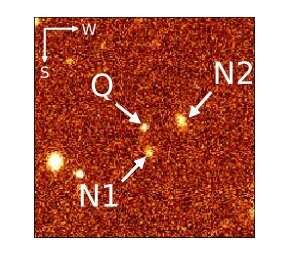
Using the Subaru Telescope, astronomers have identified two new dust-reddened (red) quasars at high redshifts. The finding, detailed in a paper published July 16 on the arXiv pre-print server, could improve the understanding of these rare but interesting objects.
Quasars, or quasi-stellar objects (QSOs), are extremely luminous active galactic nuclei (AGN) containing supermassive central black holes with accretion disks. Their redshifts are measured from the strong spectral lines that dominate their visible and ultraviolet spectra. Some QSOs are dust-reddened, hence dubbed red quasars. These objects have non-negligible amount of dust extinction, but are not completely obscured.
Astronomers are especially interested in finding new high-redshift quasars (at redshift higher than 5.0) as they are the most luminous and most distant compact objects in the observable universe. Spectra of such QSOs can be used to estimate the mass of supermassive black holes that constrain the evolution and formation models of quasars. Therefore, high-redshift quasars could serve as a powerful tool to probe the early universe.
To date, no red quasar has been identified at a redshift of above 5.0. This is mainly due to the faintness of such sources in the rest-frame ultraviolet wavelengths, and due to the lack of a large sample of quasars at high redshifts. Now, a team of astronomers led by Nanako Kato of the Ehime University in Japan, report a breakthrough in the search for high-redshift red quasars.
"We present the first discovery of dust-reddened quasars (red quasars) in the high-z universe," the astronomers wrote in the paper.
The finding was made as part of the Subaru High-z Exploration of Low-Luminosity Quasars (SHELLQs) project. The observations that led to the discovery were conducted using the Hyper Suprime-Cam (HSC) on the 8.2 m Subaru Telescope in Hawaii. The study also used data from NASA's Wide-field Infrared Survey Explorer (WISE).
Kato's team has analyzed the SHELLQs dataset containing 93 high-redshift quasars. In result, they identified four red quasar candidates and two of them, designated HSC J120505.09−000027.9 (at a redshift of 6.7) and HSC J023858.09−031845.4 (at a redshift of 5.83), were confirmed to be red quasars with dust reddening of 0.115 and 0.127, respectively.
"Two of the four candidates were found to be red quasars with dust reddening of E(B − V) > 0.1," the paper reads.
The researchers underlined that their discovery proves how much important is the HSC instrument in identifying new high-redshift QSOs, especially dust-reddened. The team plans to continue their search for high-redshift red quasars using HSC, WISE, and also data obtained with NASA's Spitzer spacecraft. They added that follow-up observations of such sources with instruments like the Thirty Meter Telescope (TMT) or James Webb Space Telescope (JWST), would be crucial in studying their individual nature in detail.
© 2020 Science X Network
Citation: Two new high-redshift red quasars discovered (2020, July 27) retrieved 27 July 2020 from https://phys.org/news/2020-07-high-redshift-red-quasars.html
This document is subject to copyright. Apart from any fair dealing for the purpose of private study or research, no part may be reproduced without the written permission. The content is provided for information purposes only.
July 27, 2020 at 08:00PM
https://phys.org/news/2020-07-high-redshift-red-quasars.html
Two new high-redshift red quasars discovered - Phys.org
https://news.google.com/search?q=Red&hl=en-US&gl=US&ceid=US:en

Really very happy to say, your post is very interesting. I never stop myself from saying something about it. You’re doing a great job. Keep it up. cheap render farm
ReplyDelete